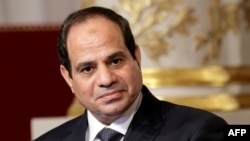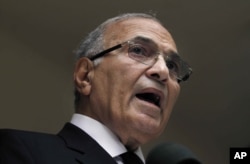Egypt's President Abdel Fattah el-Sissi has won the backing of over three-quarters of parliamentarians for a second term as president, lawmakers said on Tuesday, a day after a timeline for the election was announced.
Sissi has yet to announce his candidacy for the ballot, scheduled for March 26-28. But he is widely expected to run and win the election.
The former general won a landslide victory in an election in 2014, one year after — as a military commander — he led the overthrow of elected president Mohamed Morsi of the Muslim Brotherhood.
The election will be Egypt's third since the 2011 uprising that ended strongman Hosni Mubarak’s long rule.
Election regulations stipulate that would-be candidates must obtain the backing of at least 20 members of parliament for their candidacy or must be supported by at least 25,000 eligible voters in at least 15 governorates.
So far, 464 of the 596 members of parliament have come forward to support Sissi, deputy secretary general of parliament Mohamed Nosair said. Lawmakers are not permitted to support more than one candidate.
The national election commission has said that candidates must register from Jan. 20 to 29 and that a final list of candidates will be announced on Feb. 20.
Sissi’s critics say his popularity has been dimmed by austerity reforms, security problems and a crackdown on dissidents. But few contenders have come forward in a contest that most observers expect Sissi to win easily.
Former prime minister Ahmed Shafik, who was seen as the most serious potential challenger to Sissi's rule, said on Sunday he was no longer considering running.
Another presidential hopeful, rights lawyer Khaled Ali, faces a potential three-month prison sentence for public indecency over an alleged rude hand gesture he made outside a courthouse last year. He may be disqualified from standing if he loses his appeal on March 7.
Haitham al-Hariri, leader of a leftist bloc in parliament, told Reuters that his 16-member group of lawmakers has not signed on to Sissi’s nomination and remains open to backing other candidates.
“The bloc has disagreements with policies but not with people ... with the current policies being followed whether economic, social or security-related policies,” said Hariri.
“The bloc doesn’t believe that the continuation of these policies is best for Egypt,” he said.



